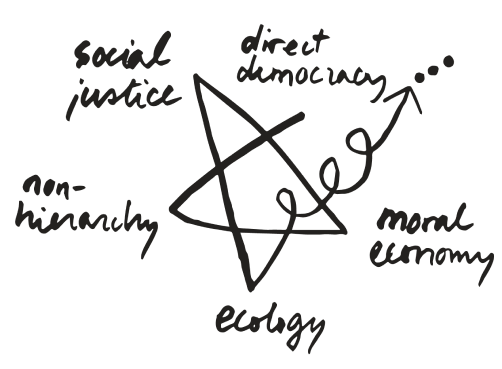1: a coherent radical critique of current social, political, and anti-ecological trends.
2: a reconstructive, ecological, communitarian, and ethical approach to society.
Social Ecology advocates a reconstructive and transformative outlook on social and environmental issues, and promotes a directly democratic, confederal politics. Social Ecology envisions a moral economy that moves beyond scarcity and hierarchy, toward a world that reharmonizes human communities with the natural world, while celebrating diversity, creativity, and freedom.

Social Ecology maintains that human beings and human society are not “separate” from nature, but are developments of natural evolution. We seek to understand nature dialectically, as an unfolding historical process of continuous change and development towards expanding diversity, interdependence, and subjectivity.
Destructive relationships between ourselves and the rest of nature are not innate to human beings, but are instead outcomes of the particular social relations structuring our society. We see ecological problems as social problems, with the domination of human beings being at the root of attempts to dominate nature.
The immense potential of humanity lies in the fact that our social relations are infinitely malleable, such that we can transform society to reharmonize ourselves with the rest of nature. This will require an end to hierarchy and domination, achieved through a social revolution to reorganize society along directly democratic and communistic lines.
Social Ecology upholds the importance of political imagination, of actively envisioning fundamentally different possible ways of relating to one another and the rest of the web of life. Through the creation of a free society, we imagine bringing humanity’s self-conscious, creative potential into collaboration rather than conflict with our ecosystems, so that we may flourish in a positive keystone ecological role.
Check out a few of our suggested introductory readings or take our class Ecology, Democracy, Utopia: Introduction to Social Ecology
To take as a self-directed flex course, register here instead.
We recommend that all people new to social ecology start with this class! A rotation of ISE faculty provide a comprehensive overview of social ecology, an interdisciplinary body of ideas that examines social and ecological problems as interconnected, from a transformative and holistic perspective. Students learn the foundations of social ecology and apply these insights to a variety of contemporary political and ecological problems, sharpening their understanding of the world while developing visionary ideas to change it. The ten units explore:
The ten units explore:
